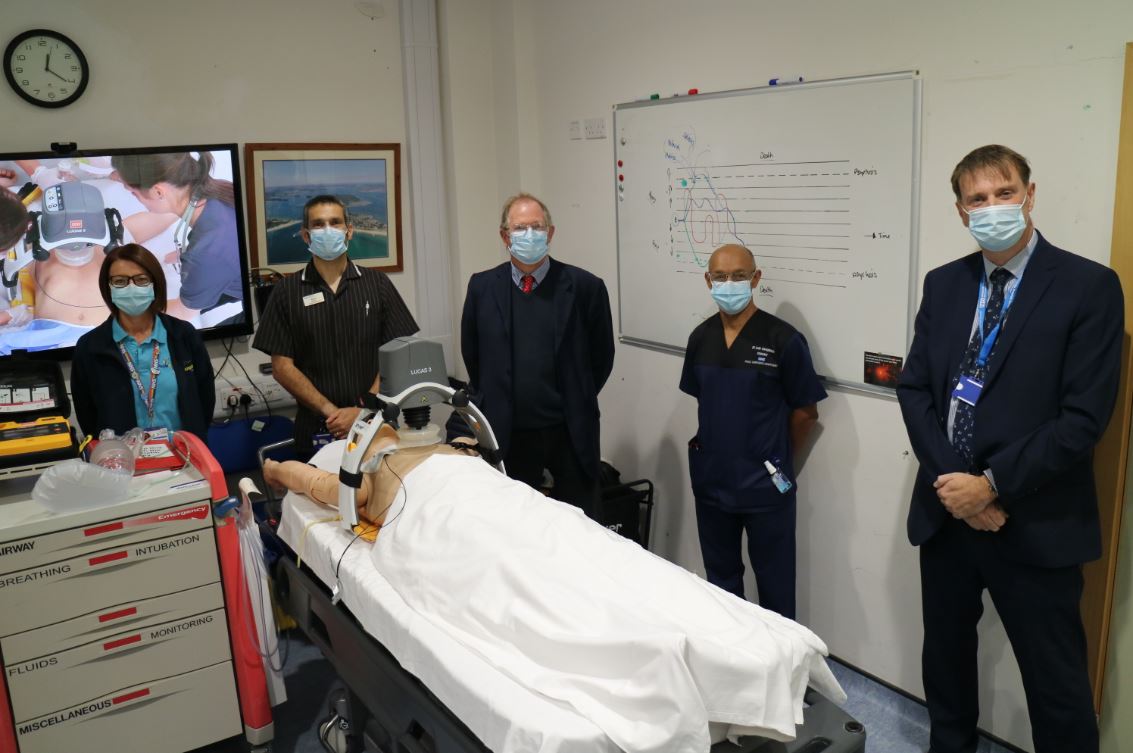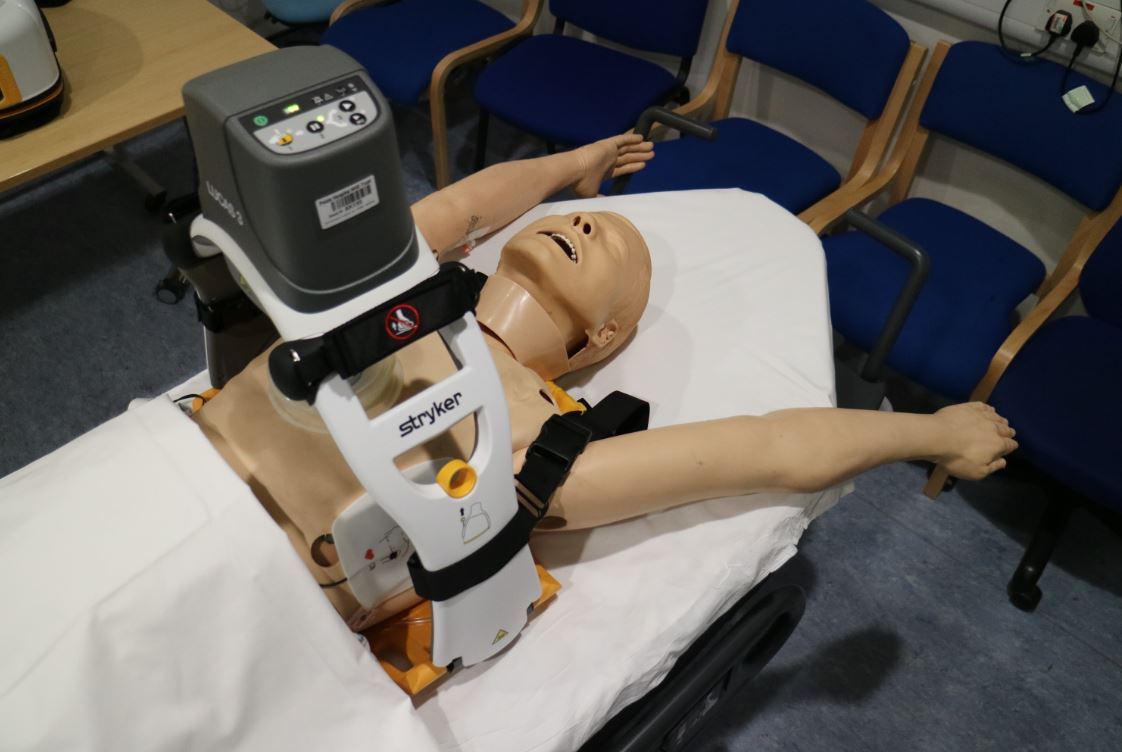Hospital trust to lead online service of remembrance
University Hospitals Dorset (UHD) is marking this year’s Pregnancy and Infant Baby Loss Remembrance Day on Thursday 15 October with a special online service of remembrance.
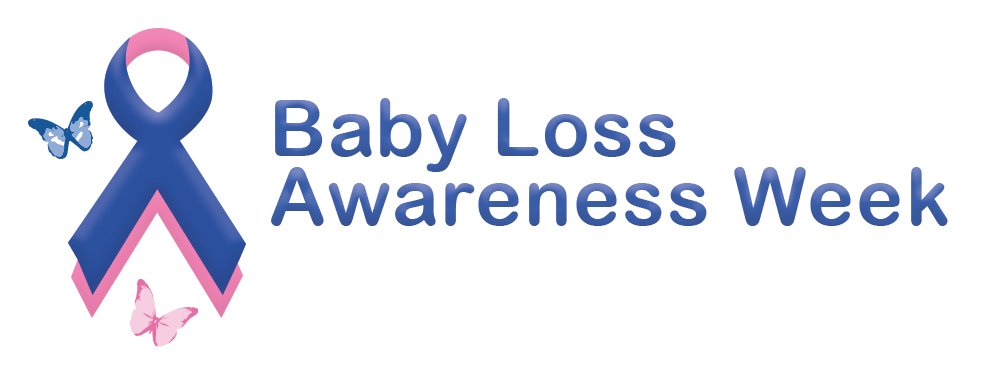
The service, hosted in the Chapel of St Luke at the Royal Bournemouth Hospital, will be led by hospital chaplain Reverend Duncan Ridgeon and the trust’s early pregnancy team. It will be streamed on the UHD Facebook page - @UHDTrust - at 7pm on Thursday.
Duncan said: “At UHD we have used this day to remember the babies that have not made it into the world by holding a short service of reflection, lighting candles and listening to music. We hope this shows that a families little ones, not seen but held in their hearts, are still important.
Particularly during the present crisis it is so important parents know there is support as they live with their grief.”
Pregnancy and Infant Loss Remembrance Day is a day of remembrance for pregnancy loss and infant death, which includes, but is not limited to, miscarriage, stillbirth, SIDS, and the death of a newborn.
‘State-of-the-art’ chest compression equipment for emergency department
Patients in cardiac arrest are set to benefit from brand new technology at Poole Hospital thanks to a local charity.
(Pictured L-R): Janine Golding, community fundraiser for Poole Hospital Charity; Bruce Hopkins, matron, emergency and urgent care; Sir Christopher Lees, Talbot Village Trust; Dr Gary Cumberbatch, clinical director, emergency and urgent care; Mark Mould, chief operating officer
The hospital’s emergency department (ED) has received a LUCAS machine from a £6,000 grant from the Talbot Village Trust. The team made the application with the support of the hospital’s charity.
Currently, cardiopulmonary resuscitation (CPR) is delivered manually for a maximum of two minutes requiring a high amount of physical effort to sustain continuous, effective CPR during a prolonged cardiac arrest. After two minutes, a change of staff is required which leads to an interruption in CPR.
The LUCAS machine provides patients who are in cardiac arrest with consistent and high-quality chest compressions for extended periods of time. The machines improve CPR quality and increase chest compression fraction time both in the hospitals and during transport throughout the entire resuscitation.
Prolonged CPR is often required as a result of drowning, for hypothermic patients in cardiac arrest and when thrombolysis has been given to a pulmonary embolism, all of which can require up to 90 minutes of CPR.
Last year there were 90 cardiac arrests in the hospital.
Dr Gary Cumberbatch, clinical director, emergency and urgent care said: “Thank you so much to Talbot Village Trust for this state-of-the-art device, it really is going to make such a difference to our patients.
“It will also take some of that physical pressure off staff meaning that we can provide even better care to the patient who is receiving the treatment.”
Commenting on the donation, Bruce Hopkins, matron, emergency and urgent care, added: “This machine is a great addition to the amazing resuscitation team we already have here at the hospital - it’s a fantastic piece of equipment and will help so many local people.”
Sir Christopher Lees, chairman of Talbot Village Trust, added: “There was an immediate need for Poole Hospital to own this specialist equipment, to continue delivering the exceptional level of care that patients receive at the hospital.
“We are pleased to have provided this grant and ensure the long-term care of our communities.”
Janine Golding, community fundraiser for Poole Hospital Charity, said: “The charity is extremely grateful to the Talbot Village Trust and looks forward to a continued partnership with them.”
This life saving, innovative equipment is above and beyond what the NHS can provide. Poole Hospital Charity exists to complement and enhance the high level of care already available in the hospital.
Your University Hospitals Dorset
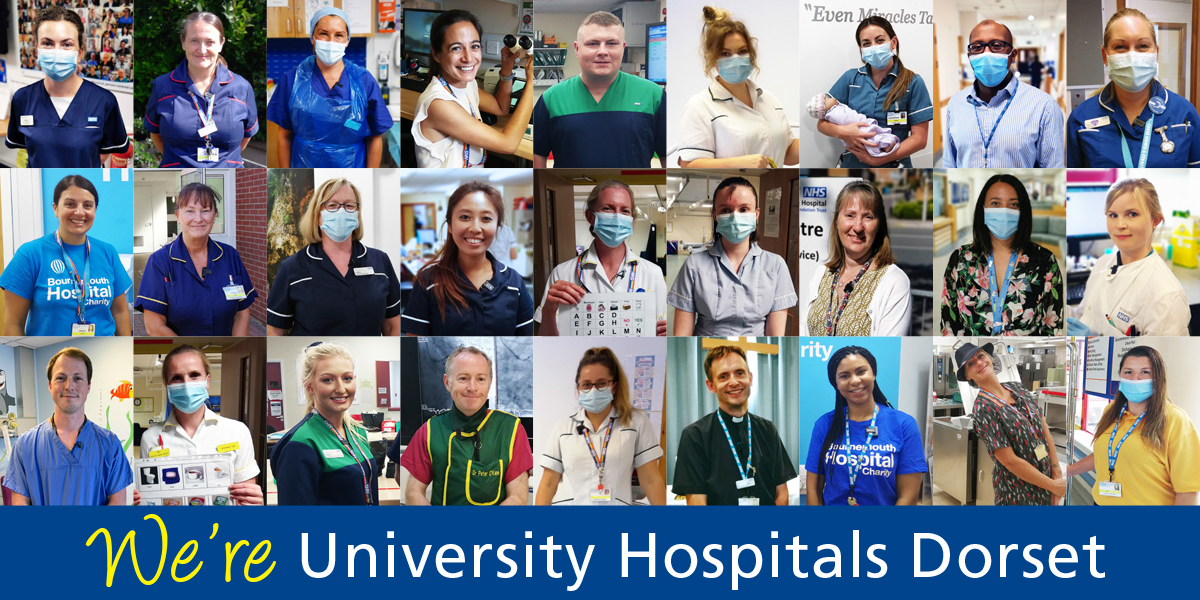
We are incredibly proud to welcome you to our new University Hospitals Dorset (UHD) website and to introduce your new Trust. Your dedicated Poole, Royal Bournemouth, and Christchurch hospitals, will continue to serve you and as a team of over 9,000 members of staff we are stronger together and look forward to constantly improving the healthcare we provide.
While our name and some of our ways of working may look different, we are more than just buildings, we are the same people you used to see, the same people committed to delivering the finest care. This poem is our message to you – things may be different, in more ways than one at the moment, but we are your committed local NHS.
As a merged organisation we will have a turnover of around £630m, which is similar to a hospital serving a large city. With this growth comes new opportunities and we are thrilled to be gaining university status, which will allow our research capability to grow and flourish. Both trusts entering this merger had good previous CQC ratings, with outstanding awards in one area each. This is now an opportunity to combine the outstanding elements from both to create a single outstanding organisation, with new standards of excellence and quality, at the heart of the east Dorset community.
Debbie Fleming, joint Chief Executive of UHD said: "We believe our merger will help our three hospitals to provide even better care, and develop world-class services as we become a university hospital trust working with Bournemouth University. Our new organisation will allow us to work better together to tackle Covid-19 and realise our ambitious plans for the future. Our people are most definitely our greatest asset, and we shall be doing great things together, to make the very best of our opportunities."
David Moss, joint Chairman said: "We thank all our partners, including Dorset Healthcare, Dorset County Hospital, our local councils, South Western Ambulance Service and the Dorset CCG. We look forward to continuing to work closely together as part of the Our Dorset Integrated Care System to realise the full benefits of our merger and our bright future together as University Hospitals Dorset."
Landmark hospital trust merger
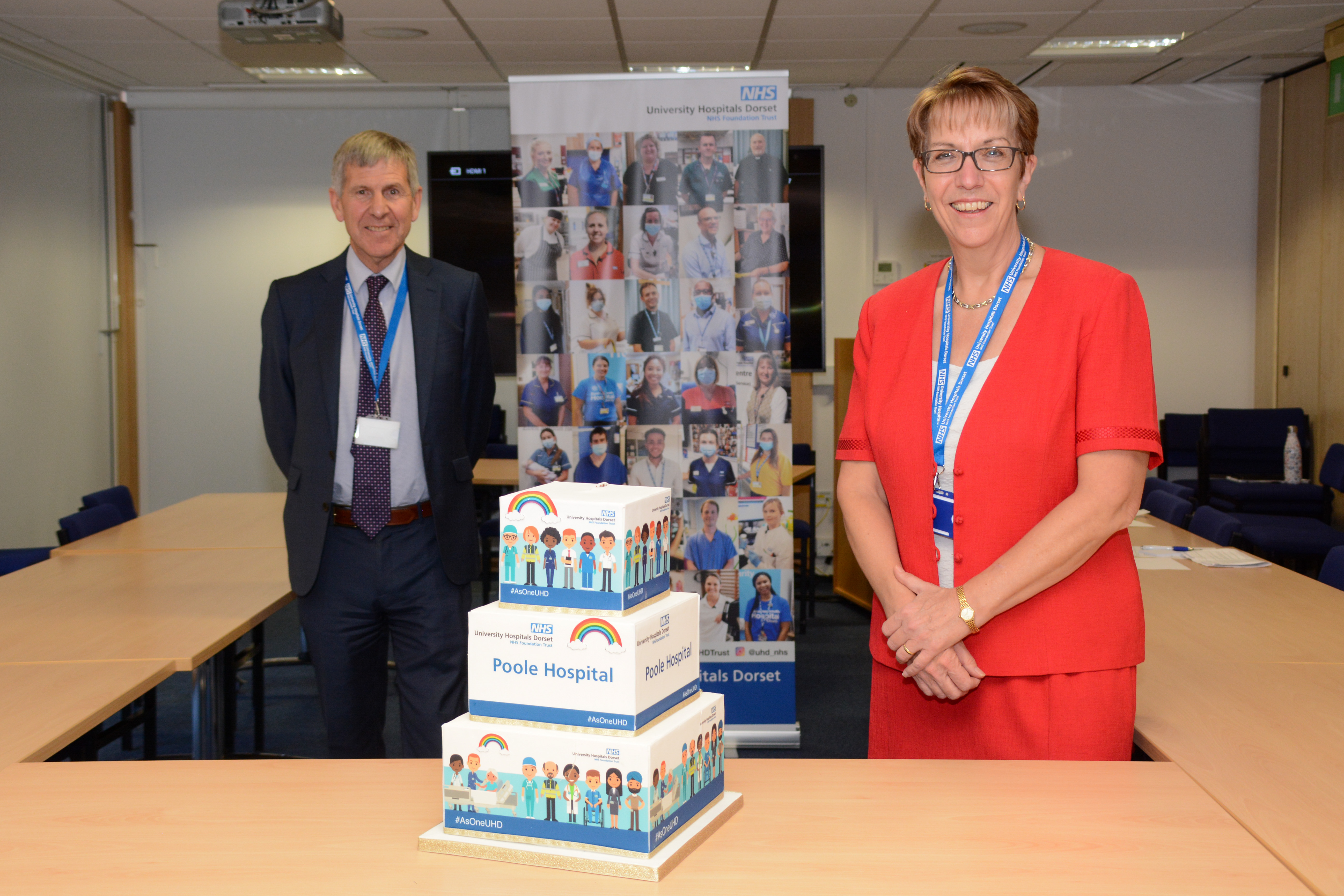
The two trusts that run Poole Hospital and the Royal Bournemouth and Christchurch Hospitals have today merged to form University Hospitals Dorset NHS Foundation Trust (UHD), with ambitious plans to improve and transform services for patients.
This merger has been nine years in the making, with an earlier proposal prohibited by the Competition and Markets Authority. Since then, the two trusts have been working with partners across Dorset to develop a compelling future vision for the transformation of services. Clinicians and staff across both trusts, along with key local stakeholders, are now very clear that the merger will bring about significant benefits for patients.
The new organisation is designated as a 'university hospital trust', having formalised the links with Bournemouth University that both hospital trusts have enjoyed for many years. This reinforces the commitment of the new organisation to expanding research, fostering innovation and prioritising education and training.
The new University Hospitals Dorset employs more than 9,000 staff and has an annual turnover of more than £630m. Each hospital – Poole Hospital, the Royal Bournemouth Hospital and Christchurch Hospital – will retain its own name, and will benefit from significant future investment, planned for all three sites as part of the trust’s ambitious capital programme.
Debbie Fleming, chief executive, said that establishing the new trust makes possible many exciting developments, both now and in the future.
"University Hospital Dorset NHS Foundation Trust will be a stronger, more resilient organisation, which means we will be able to deliver much improved services for our patients. The new trust will be a great place to work, and we expect to see talented individuals from across the country choosing to join us, and be part of the exciting transformation plans in Dorset.
"Today marks a watershed moment for acute hospital care in this area."
To mark the occasion, a virtual celebration event was held for staff and public, hosted by Debbie and trust chairman David Moss. It included contributions from national and regional NHS chiefs and messages of support from health and social care partners. There were many good wishes sent in by former colleagues and supporters - including some famous faces such as actor Guy Henry, patron of the Poole Hospital Cancer Treatment Trust, and local resident and former football manager Harry Redknapp. The celebrations included the release of a film of a new poem, specially written for the occasion and featuring more than 60 staff from across the three hospitals.
You can watch the event at https://youtu.be/rUblsI8eOSM.
Professor John Vinney, vice-chancellor of Bournemouth University, said: "We have a long history of close working with both trusts, and have been doing so very effectively for many years. This joint work has included training staff, jointly publishing research and working together to enrich society and focus on societal benefit.
"Both organisations have a huge amount in common in terms of our ambitions and our vision and we really look forward to working even more closely as part of a new partnership with University Hospitals Dorset."
To support the merger, the hospital has issued new phone numbers to all staff, which will show as calls from 0300 019 numbers, and new email addresses ending in @uhd.nhd.uk. Old and new email and phone numbers will run side by side for the next few months.
Tree in memory of Covid-19 patients and staff
A patient recently discharged from Poole Hospital after spending seven weeks in the hospitals critical care unit with coronavirus has attended a special tree planting ceremony to honour those affected by the pandemic.
Greg Wain, 62, (pictured below, far right) who has had a 42 year career in the NHS, was admitted to the hospital on 15 April and was discharged in late July following months of rehabilitation initially in critical care, then Portland Ward, to regain lost mobility and muscle mass.
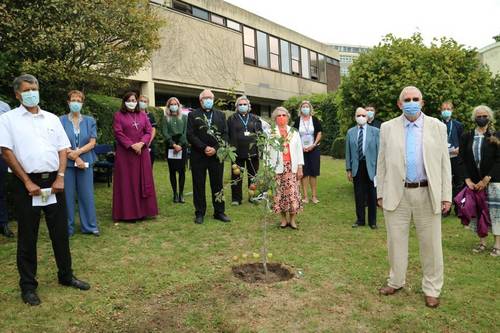
Commenting on his time on the critical care unit Greg said: "I used calming images and memories from my childhood to soothe myself, and did a lot of praying, and that brought real comfort."
The 'Lord Lambourne' dessert apple tree was planted in at a special reception on September 9, with Greg being joined at the event by the Mayor of Poole, Cllr Marion Le Poidevin, who dedicated the tree, and a range of local faith leaders including The Right Revd. Karen Gorman, Bishop of Sherborne, and Rabbi Maurice Michaels of Bournemouth Reform Synagogue together with hospital staff.
The idea came from Revd. Declan McConville, the hospital's lead chaplain, who wanted to create 'living memorial' on the hospital site to represent the strength, resilience and the commitment of family, friends and the hospital's staff during the pandemic.
Speaking at the event Greg said: "It's been quite a journey to say the least but I'm profoundly thankful for the support, the love and professional expertise that has been shown by those who cared for me.
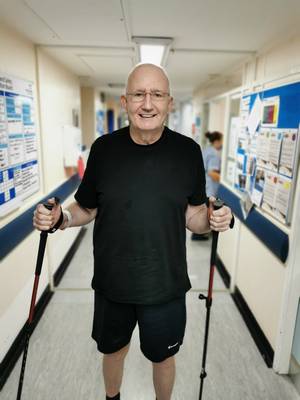
"Without their benevolent humour and 'tough love' I wouldn't be able to stand here today.
"We should never forget all of my NHS colleagues who have selflessly dedicated their lives to care for others and regrettably were not as lucky as myself in surviving the ravages of this appalling illness."
Debbie Fleming, joint chief executive, added: "It's really important to be able to come together and we hope this tree will give staff an important place for reflection for many years to come."
The tree is situated alongside other memorial trees in a small garden on the hospital site.
As part of the event attendees had the opportunity to lay pebbles, painted by children from hospital's paediatric unit in rainbow colours, at the base of the tree.






